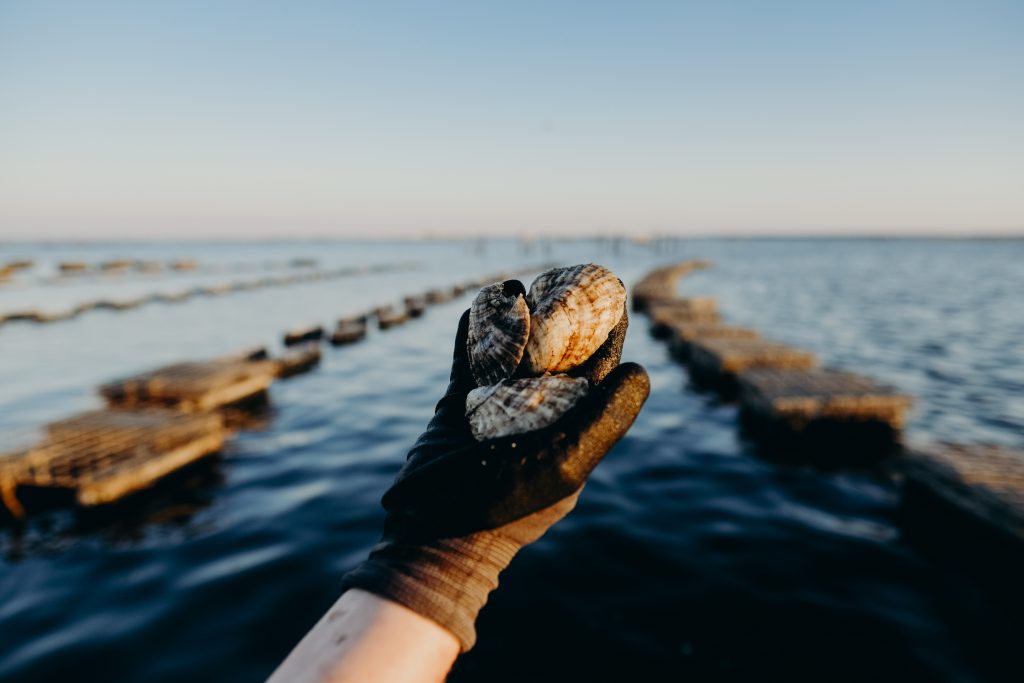
Agriculture, Aquaculture and Enterprise in Tallahassee
Individuals intent on reviving the oyster industry, entrepreneurial enterprises with a flair for food and drink and small scale organic to traditional farms are at the forefront of transforming Tallahassee from a mainstream food scene into a dynamic, diverse and desirable food culture.
These grassroots efforts have emerged and evolved independently but are collectively changing perceptions about Tallahassee’s food persona. Some of the people influencing this change are profiled below.
Oyster Advocate

Most mornings find Deborah Keller boarding her boat and heading south of Tallahassee to Oyster Bay around sunrise. No pleasure cruise, these launches represent labors of love. Known as OysterMom, Keller has been key to helping Florida’s oyster industry become more sustainable and bountiful.
While working for the Nature Conservancy, Keller was tasked with making Florida’s cumbersome regulations governing oyster farms into more manageable guidelines. Crippled by over harvesting and pollutants, the wild oyster industry in Apalachicola Bay is currently under a Florida Fish and Wildlife Conservation Commission ban that prohibits harvesting for five years to allow the oysters time to repopulate and replenish.
“When we started the program, there were lots of permits and permissions required to make oyster aquaculture a viable industry in Florida,” Keller said. “It took about a year. That’s when it occurred to me to take the plunge and open my own oyster farm.”
Keller leases a 1.5 acre parcel of water from the state that she stocks with oyster seeds, early-stage oysters, that she purchases from a certified hatchery. Bags of oysters are submerged into the bay and placed within the 250 tethered cages she manages.
Periodically, she retrieves the bags to flip the oysters so they have ample room to float and easily feed naturally on the nutrients of the waters filtering through their systems. Eventually they are sorted according to size and, upon reaching maturity, are harvested for sale at local farmers markets, area restaurants, through the Red Hills Small Farm Alliance marketplace or directly to consumers via Keller’s website.
“In 30 minutes I can harvest 3,000 to 4,000 oysters, then head back to the dock and get them into refrigeration,” she said. As impressive as that number may seem, Keller is quick to note that it is only a fraction of the harvests that used to fill up 18-wheeler trucks hauling Florida oysters on a daily basis.
“My first goal was to help grow the oyster industry back to a healthy place. Oysters are part of the culture in this area,” she said. “I want to revive the industry that collapsed. But there are more people involved than just the producers – the marketers, web designers, boat repair businesses – are all part of this huge network. We need to get oysters back in the water to create jobs and bring this Florida delicacy back to our homes and our social lives.”
“I feel like a mom to this industry and now I am breeding new oyster farmers on my farm and who then go off on their own to grow the industry,” Keller noted.
Tasty Concepts
Chef Sam Burgess first found success serving his Caribbean-inspired dishes from his namesake Sam’s Pineapple Express food truck. That compact cooking space marked the debut of his signature “serving dishes” for take-out food. Fresh pineapples halved and hollowed provided the perfect presentation for the fresh flavors that abound in his rice-based bowls comprised of a choice of protein, sauce and his proprietary salsa.

Encouraged by other food truck operators and friends, the founder, chef and cookbook author behind Pineappetit made the move to a brick-and-mortar casual dining concept in 2021.
“My restaurant is one of Tallahassee’s hidden gems. The walls are brightly colored, we always have music playing and we provide a stand out atmosphere that includes great customer service,” he said of the Black-owned business. “I wanted to create an experience so people want to come back for the good food and because what we offer is different.”
Eventually, Burgess plans to use the culinary skills acquired from his catering business, food trucks and restaurant to help others, whether through hosting cooking classes for high school students or supporting other chefs to pursue their personal dreams.
Barby Moro, owner and CEO of Tallahassee’s three RedEye Coffee locations, compares coffeehouses to community centers where people gather for conversation, commerce and to enjoy food and beverages throughout the day. As the first Hispanic woman to own and operate a commercial coffee roasting business in Tallahassee, and possibly the region, she has strategically guided the business in new directions since taking its helm in 2020.

House roasted, single origin beans became the base for the brand’s hot and cold brew coffees. Customers can sample varieties of coffees and teas via tasting flights similar to those found at wine bars and breweries. Shelves display locally sourced foods and goods, like granolas from Orchard Pond Organic Farm, for sale. To encourage customers to drop by day and night, she plans to add alcohol to the menu.
“I am broadening the cliche of a coffeehouse to make it a retail outlet for local products and bringing beer and wine and small plates to the mix. My focus on building the business is by building relationships through community outreach, partnerships and inclusiveness,” said Moro.
Describing Tallahassee as a community that is increasingly attracting, and retaining young professionals, she believes the time is right for community-based businesses to work together.
“We offer something that is local, different and have the ability build relationships and deepen connections with the people we serve,” she said.
Food Network
Integral to the farm-to-table and direct-to-consumer movement of locally sourced products is the Red Hills Small Farm Alliance. The non-profit, membership-driven organization supports small farms and other food-related businesses located within a 100-mile radius of Tallahassee. Four women with ties to agriculture founded the alliance in 2010.
The group provides professional educational development to small farm enterprises and connects farms with the community through a website promoting nearby farmers markets and local restaurant partners. Red Hills Certified products represent a wide variety of foods including granola to grits, locally roasted coffees to loose leaf teas, chicken to cheese and beef to baked goods.
Promoting regional resources helps build awareness and appreciation for the quality of food that is available from community providers, according to Cari Roth, president of the alliance board and a local attorney. Demand for farm goods significantly increased when the COVID-19 pandemic slowed deliveries of goods, shuttered businesses and motivated people to make their own meals. Many customers who relied on local farms during then have continued to place orders and patronize farmers markets.
“Tallahassee is an urban center in the middle of rural land. More and more people are looking for good, clean food and they can find it here,” said Roth. “You want to support someone locally because then the dollars stay in the community. It is a huge economic benefit to shop with local farmers. And the farmers appreciate each other. They don’t view each other as competitors but as colleagues.
“We are working together to strengthen our local food system but I still feel that there is a huge amount of growth potential. We have an amazingly vibrant small farm scene in Tallahassee and throughout the region. It’s very easy, and easily accessible, to get local products,” she added.
Mary Lou Janson


